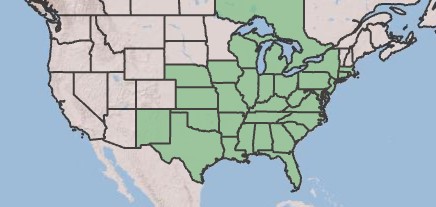Difference between revisions of "Cercis canadensis"
(Created page with "{{subst:Template:PlantName}}") |
(→Taxonomic Notes) |
||
| (5 intermediate revisions by 3 users not shown) | |||
| Line 2: | Line 2: | ||
<!-- Get the taxonomy information from the NRCS Plants database --> | <!-- Get the taxonomy information from the NRCS Plants database --> | ||
{{taxobox | {{taxobox | ||
| − | | name = | + | | name = Cercis canadensis |
| image = | | image = | ||
| image_caption = Photo by | | image_caption = Photo by | ||
| Line 8: | Line 8: | ||
| divisio = Magnoliophyta - Flowering plants | | divisio = Magnoliophyta - Flowering plants | ||
| classis = Magnoliopsida - Dicots | | classis = Magnoliopsida - Dicots | ||
| − | | ordo = | + | | ordo = Fabales |
| − | | familia = | + | | familia = Fabaceae / Leguminosae |
| − | | genus = '' | + | | genus = ''Cercis'' |
| − | | species = ''''' | + | | species = '''''C. canadensis''''' |
| − | | binomial = '' | + | | binomial = ''Cercis canadensis'' |
| − | | binomial_authority = | + | | binomial_authority = L. |
| − | | range_map = | + | | range_map = CERC_CANA_DIST.jpg |
| − | | range_map_caption = Natural range of '' | + | | range_map_caption = Natural range of ''Cercis canadensis'' from USDA NRCS [http://www.plants.usda.gov Plants Database]. |
}} | }} | ||
| − | Common name: | + | Common name: eastern redbud |
==Taxonomic Notes== | ==Taxonomic Notes== | ||
| − | Synonyms: | + | Synonyms: ''Cercis canadensis'' Linnaeus var. ''canadensis''<ref name=weakley>Weakley, A.S. 2020. Flora of the Southeastern United States. Edition of 20 October 2020. University of North Carolina at Chapel Hill, Chapel Hill, North Carolina.</ref> |
| + | |||
| + | Varieties: ''Cercis dilatata'' Greene; ''C. georgiana'' Greene<ref name=weakley/> | ||
| + | |||
==Description== | ==Description== | ||
<!-- Basic life history facts such as annual/perennial, monoecious/dioecious, root morphology, seed type, etc. --> | <!-- Basic life history facts such as annual/perennial, monoecious/dioecious, root morphology, seed type, etc. --> | ||
| Line 25: | Line 28: | ||
==Distribution== | ==Distribution== | ||
==Ecology== | ==Ecology== | ||
| − | + | ===Habitat=== | |
| + | ''C. canadensis'' can be found as an understory tree in natural communities such as deciduous forests, mixed pinewoods, pine-oak woodlands, and mesic hammocks. It can grow in loam or sandy loam soil on slopes, bluffs, and floodplains. ''C. canadensis'' also occurs in disturbed areas such as roadsides, ditches, along railroads, and in landscaping.<ref name = fsu> Florida State University Robert K. Godfrey Herbarium database. URL: http://herbarium.bio.fsu.edu. Last accessed: May 2023. Collectors: Loran C. Anderson, K. Craddock Burks, Allan Buzhardt, W. G. D'Arcy, Kurt E. Blum, Patricia Elliot, G. Gil, C. J. Hansen, Gerald Long Karen MacClendon, Richard Mitchell, Elmer C. Prichard, Gwynn W. Ramsey, Mary Scott, John W. Thieret, and Larry Williams. States and counties: Alabama: Barbour and Escambia. Florida: Alachua, Calhoun, Gadsden, Jefferson, Lake, Leon, Liberty, Madison, Suwannee, Taylor, and Wakulla. Georgia: Grady and Miller. Louisiana: St Landry. South Carolina: Fairfield. Tennessee: Montgomery.</ref> | ||
| + | |||
| + | Associated species of ''C. canadensis'' include ''[[Magnolia pyramidata]]'' and ''Acer barbatum''.<ref name=fsu/> | ||
<!--===Phenology===--> <!--Timing off flowering, fruiting, seed dispersal, and environmental triggers. Cite PanFlora website if appropriate: http://www.gilnelson.com/PanFlora/ --> | <!--===Phenology===--> <!--Timing off flowering, fruiting, seed dispersal, and environmental triggers. Cite PanFlora website if appropriate: http://www.gilnelson.com/PanFlora/ --> | ||
<!--===Seed dispersal===--> | <!--===Seed dispersal===--> | ||
Latest revision as of 08:01, 14 July 2023
| Cercis canadensis | |
|---|---|
| Scientific classification | |
| Kingdom: | Plantae |
| Division: | Magnoliophyta - Flowering plants |
| Class: | Magnoliopsida - Dicots |
| Order: | Fabales |
| Family: | Fabaceae / Leguminosae |
| Genus: | Cercis |
| Species: | C. canadensis |
| Binomial name | |
| Cercis canadensis L. | |

| |
| Natural range of Cercis canadensis from USDA NRCS Plants Database. | |
Common name: eastern redbud
Contents
Taxonomic Notes
Synonyms: Cercis canadensis Linnaeus var. canadensis[1]
Varieties: Cercis dilatata Greene; C. georgiana Greene[1]
Description
Distribution
Ecology
Habitat
C. canadensis can be found as an understory tree in natural communities such as deciduous forests, mixed pinewoods, pine-oak woodlands, and mesic hammocks. It can grow in loam or sandy loam soil on slopes, bluffs, and floodplains. C. canadensis also occurs in disturbed areas such as roadsides, ditches, along railroads, and in landscaping.[2]
Associated species of C. canadensis include Magnolia pyramidata and Acer barbatum.[2]
Conservation, cultivation, and restoration
Cultural use
Photo Gallery
References and notes
- ↑ 1.0 1.1 Weakley, A.S. 2020. Flora of the Southeastern United States. Edition of 20 October 2020. University of North Carolina at Chapel Hill, Chapel Hill, North Carolina.
- ↑ 2.0 2.1 Florida State University Robert K. Godfrey Herbarium database. URL: http://herbarium.bio.fsu.edu. Last accessed: May 2023. Collectors: Loran C. Anderson, K. Craddock Burks, Allan Buzhardt, W. G. D'Arcy, Kurt E. Blum, Patricia Elliot, G. Gil, C. J. Hansen, Gerald Long Karen MacClendon, Richard Mitchell, Elmer C. Prichard, Gwynn W. Ramsey, Mary Scott, John W. Thieret, and Larry Williams. States and counties: Alabama: Barbour and Escambia. Florida: Alachua, Calhoun, Gadsden, Jefferson, Lake, Leon, Liberty, Madison, Suwannee, Taylor, and Wakulla. Georgia: Grady and Miller. Louisiana: St Landry. South Carolina: Fairfield. Tennessee: Montgomery.